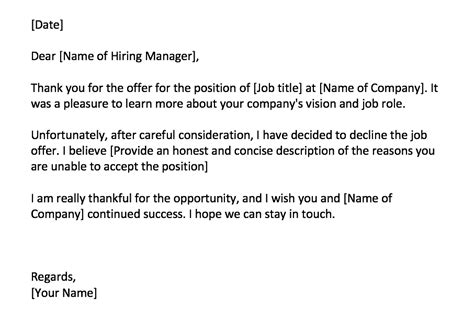Respecting Job Offers: Decline Gracefully (With Examples)

Receiving a job offer can be an exciting and rewarding experience. However, there may be times when you need to decline an offer for various reasons. It’s important to decline gracefully and respectfully to maintain a positive relationship with the employer and leave the door open for future opportunities. In this post, we’ll explore tips and examples of how to decline a job offer respectfully.
Why Respecting Job Offers Is Important
Declining a job offer can be a difficult decision, but doing so with respect and professionalism is crucial for several reasons:
- Leaving a positive impression: Declining a job offer respectfully can leave a positive impression on the employer. It shows that you’re professional, considerate, and value their time.
- Keeping the door open: Declining a job offer with respect can keep the door open for future opportunities with the company. You never know when another position may become available that’s a better fit for your skills and career goals.
- Maintaining your network: Declining a job offer respectfully can maintain your network and professional relationships. You never know when you may need to reach out to the employer for advice, referrals, or recommendations.
How to Decline a Job Offer Respectfully
1. Respond promptly
When you receive a job offer, it’s important to respond promptly. This shows that you value the employer’s time and effort. Ideally, you should respond within 24-48 hours of receiving the offer.
2. Express gratitude
When declining a job offer, it’s important to express gratitude for the opportunity. You can do this by thanking the employer for their time, effort, and consideration.
For example:
Thank you for offering me the position. I appreciate the time and effort you and your team put into the interview process.
3. Provide a reason
It’s important to provide a reason for declining the job offer. This can help the employer understand your decision and make improvements for future candidates. Be honest and professional when providing a reason.
For example:
After careful consideration, I have decided to decline the job offer. While I was impressed with the company and the position, I have accepted another opportunity that aligns better with my career goals.
4. Keep it brief
When declining a job offer, it’s important to keep your response brief and to the point. Avoid going into too much detail or providing unnecessary information.
5. Offer to stay in touch
Even if you’re declining a job offer, it’s important to maintain a positive relationship with the employer. You can do this by offering to stay in touch and thanking them for the opportunity.
For example:
While I’m unable to accept the position, I appreciate the opportunity and would like to keep in touch. Please let me know if there are any future opportunities that align with my skills and career goals.
FAQs
Q: Should I decline a job offer over the phone or email?
A: It’s best to decline a job offer over email to ensure that you have a written record of the conversation. However, if you have a close relationship with the employer, it may be appropriate to decline over the phone.
Q: Do I need to provide a reason for declining a job offer?
A: While it’s not required, it’s professional and courteous to provide a reason for declining a job offer. This can help the employer understand your decision and make improvements for future candidates.
Q: Can I change my mind after declining a job offer?
A: It’s possible to change your mind after declining a job offer, but it’s important to do so respectfully and professionally. Reach out to the employer and explain your decision. Keep in mind that they may have already filled the position or moved on to other candidates.
Q: Should I burn bridges when declining a job offer?
A: No, it’s important to maintain a positive relationship with the employer even if you’re declining the job offer. You never know when you may need to reach out to them for advice, referrals, or recommendations.
Conclusion
Declining a job offer can be a difficult decision, but doing so with respect and professionalism can leave a positive impression on the employer and maintain your professional relationships. Remember to respond promptly, express gratitude, provide a reason, keep it brief, and offer to stay in touch. By following these tips and examples, you can decline a job offer respectfully and leave the door open for future opportunities.
